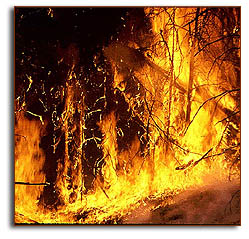 Source: NOAA
Source: NOAA
Small animals are also able to wait out the fire below ground.
However, man has prevented fires in some areas which are prone to regular burns. This means that flamable material accumulates, so that if a fire actually occurs, the fire will burn longer and hotter and could wipe out a plant or animal species which has adapted to be able to survive the regular natural pattern of fires.
 Source: NOAA
Source: NOAA
Regular fires are necessary for certain types of habitats to survive. For example, some open field areas became shrublands once humans eliminated the regular fires which favoured grasses over trees and bushes.
Even in predominantly forested areas, fire creates opportunities for pioneer species which colonize new clearings. Over time, these clearing will again be replaced by mature forests. This process of turnover and transition is known as succession.
![[home]](gsbann.gif)